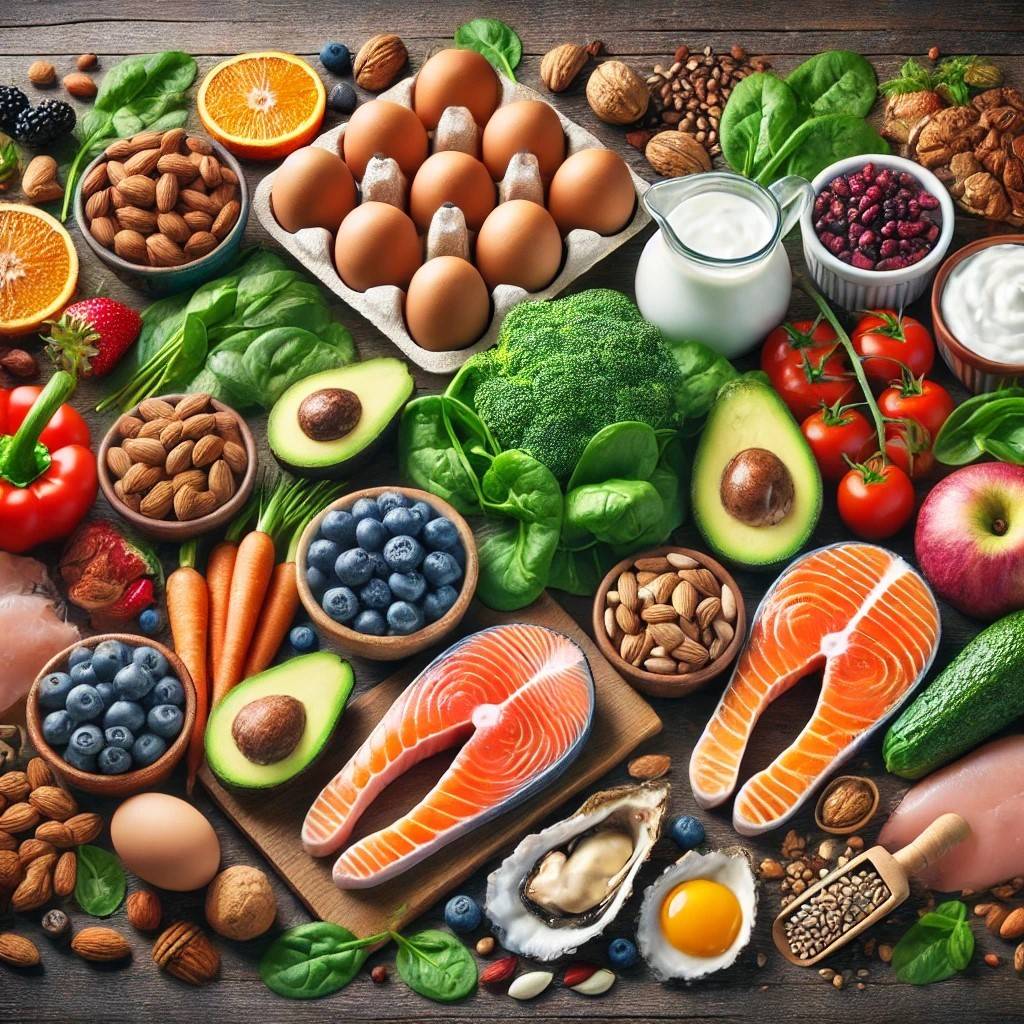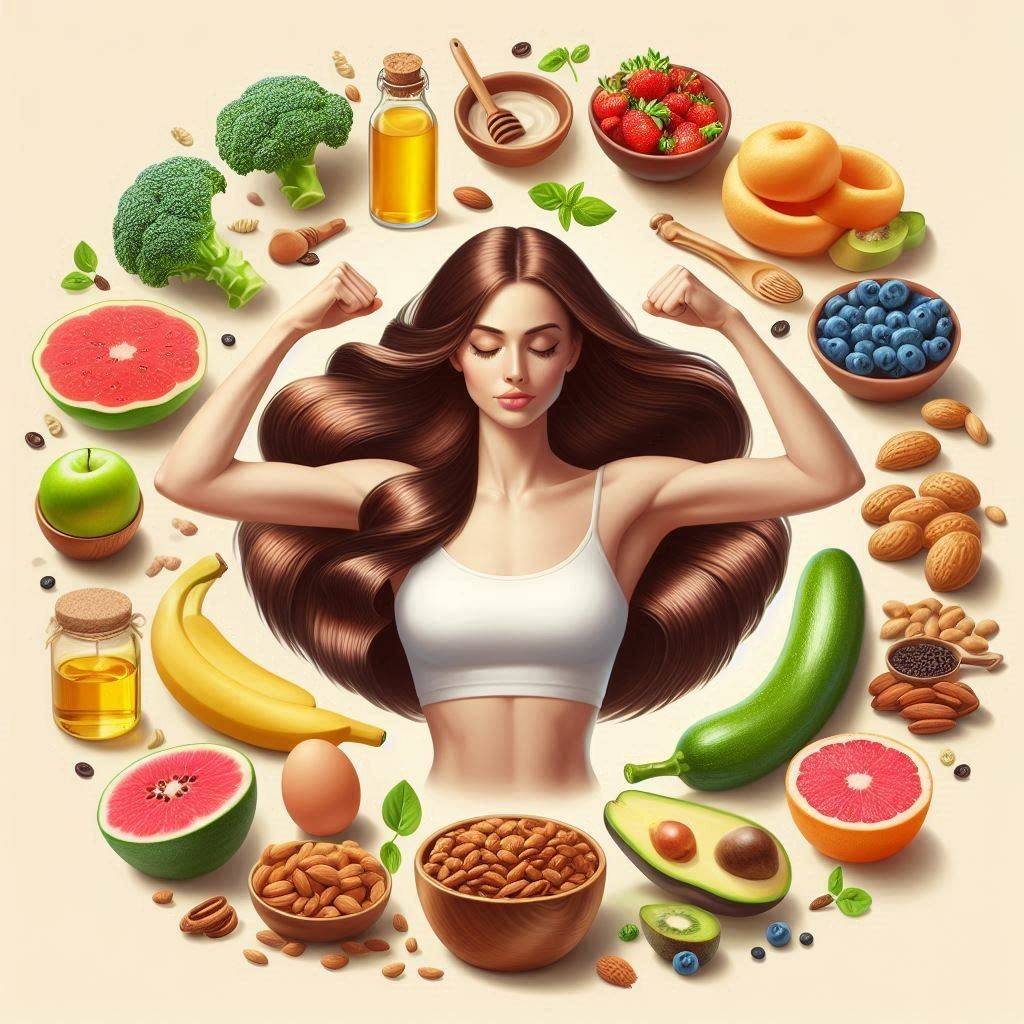Discover 14 strong hair foods that boost growth and shine. Learn more about how these delicious options can transform your hair health!
For getting strong, healthy hair, I’ve learned that diet is one of the biggest factors. Hair care products help, but the food you eat makes a real difference.
I’ll walk you through 14 foods for hair growth that I recommend based on what I’ve tried, researched, and seen work for others.
Why Food Matters Hair Health?
I used to focus only on shampoos and conditioners to take care of my hair. But over time, I noticed that my diet affected my hair strength and shine. Hair needs specific vitamins, proteins, and minerals to stay strong. If you miss out on these nutrients, it’s easy for your hair to get weak or dull. A nutrient-rich diet for hair supports hair growth from the inside, giving hair follicles what they need.
When I started including more hair-boosting foods in my diet, I saw less hair breakage and more shine. Eating right is one of my favourite natural hair growth remedies because it’s simple and effective.
Top 14 strong hair foods

These are the foods I like and recommend for anyone wanting thicker, shinier hair.
1. Eggs
Eggs are my go-to because they’re packed with protein and biotin. I love them because they’re versatile. You can eat them any time of the day. Protein builds the structure of each hair strand, while biotin is essential for healthy hair growth.
Note: Protein and biotin work together to make hair stronger and less prone to breakage.
2. Spinach
I’ve noticed that my hair feels healthier when I eat more leafy greens like spinach. Iron deficiency and hair loss often go hand in hand. Spinach has iron, which boosts blood flow to the scalp, and vitamin C to help your body absorb that iron. I like to throw spinach in smoothies or salads. It’s easy and gives me a boost for strong hair.
Note: Iron carries oxygen to hair follicles, which supports growth and prevents hair loss.
3. Salmon
Salmon is rich in omega-3 fatty acids, which support scalp health and keep hair shiny. When I added more salmon to my diet, I noticed my scalp felt less dry, especially during winter. It’s one of my favourite hair-friendly nutrients because it keeps hair hydrated and glossy.
Note: Omega-3s keep hair moisturized from within, improving both texture and shine.
4. Sweet Potatoes
Sweet potatoes are high in beta-carotene, which turns into vitamin A in the body. This is great for hair hydration. I eat sweet potatoes as a side dish, especially because they help prevent dryness and split ends.
Note: Vitamin A helps produce sebum, a natural oil that keeps the scalp and hair moisturized.
5. Nuts
Nuts, especially almonds and walnuts, are packed with vitamin E, which supports blood flow to the scalp. They’re also full of zinc for hair strength. I keep a handful of nuts as a snack because they’re an easy way to get hair-friendly nutrients.
Note: Nuts have antioxidants that protect hair from damage and reduce hair thinning.
6. Berries
I like adding berries to my breakfast for their antioxidants. Antioxidants protect hair follicles from damage, while vitamin C boosts collagen for hair, making strands stronger. The best fruits for hair growth include strawberries, blueberries, and raspberries.
Note: Vitamin C helps collagen production, which strengthens hair strands.
7. Avocados
Avocados have healthy fats that improve hair texture. They’re high in vitamin E, which I’ve found makes my hair feel softer and shinier. When I add avocados to my meals, I notice my hair is less frizzy.
Note: Healthy fats and vitamin E support hair moisture and reduce dryness.
8. Greek Yogurt
Greek yogurt is a favourite of mine because it’s high in protein and vitamin B5. This helps blood flow to the scalp and strengthens hair from the root. It’s also a successful way to get nutrients for hair density.
Note: Protein keeps hair roots strong, preventing breakage and hair loss.
9. Oysters
Oysters may seem like an unusual choice, but they’re rich in zinc, which I’ve found is great for hair growth and repair. I don’t eat them often, but when I do, I see a boost in my hair’s shine.
Note: Zinc deficiency can lead to hair loss, so adding it back into the diet helps.
10. Beans
Beans are a plant-based source of protein, iron, zinc, and biotin. They’re budget-friendly and versatile, so I add them to salads or soups. The best food sources for hair often include beans, as they provide multiple nutrients for hair strength.
Note: Beans support hair structure and help prevent hair loss.
11. Seeds
Chia seeds and flaxseeds are loaded with omega-3 fatty acids and antioxidants. I add them to smoothies or oatmeal for an easy way to get hair-boosting nutrients. They’re small but powerful for scalp health.
Note: Omega-3s and antioxidants in seeds nourish hair and support growth.
12. Bell Peppers
Bell peppers, especially red ones, are packed with vitamin C, which helps create collagen. I like adding bell peppers to stir-fries because they’re delicious and give my hair a healthy look.
Note: Vitamin C strengthens hair by boosting collagen production.
13. Carrots
Carrots are high in beta-carotene, which the body turns into vitamin A. When I include carrots in my diet, my hair feels stronger. It’s also successful for scalp health.
Note: Vitamin keeps the scalp and hair moisturized, reducing breakage.
14. Chicken
Chicken is a successful source of lean protein. When I eat more chicken, I notice my hair feels stronger and grows faster. Protein is essential for keratin production, which is what hair is made of.
Note: Protein provides the structure for each hair strand, preventing weakness and breakage.
How These Foods Help Hair Health
Incorporating these foods into your diet provides essential nutrients like vitamins A, C, D, and E, along with iron, zinc, protein, and omega-3 fatty acids. Each of these nutrients helps maintain hair health in different ways:
- Protein builds hair structure. Without enough protein, hair becomes weak.
- Omega-3 fatty acids keep the scalp hydrated, preventing dryness and supporting shine.
- Vitamin C helps collagen production, strengthening hair follicles.
- Iron supports blood flow to hair follicles, which promotes growth.
- Zinc is essential for scalp health and helps repair hair.
Why these matters: Getting a balanced mix of these nutrients can help prevent hair thinning, boost hair strength, and promote natural shine.
FAQs About Strong Hair Foods
Which food is best for strong hair?
In my opinion, eggs are the best food for strong hair because they provide both protein and biotin. These are keys for hair structure and growth.
How can I make my hair stronger?
I recommend a balanced diet rich in proteins, vitamins, and minerals. Adding foods like eggs, spinach, salmon, and nuts to your meals can strengthen your hair over time. Avoid over-styling and use gentle hair products to reduce breakage.
What should I eat to have thicker hair?
For thicker hair, eat foods like berries, Greek yogurt, and nuts. These foods contain vitamins and antioxidants that support hair density and prevent hair loss.
What can I drink for strong hair?
Water is the best drink for hair hydration, but you can also try carrot juice or green tea. Carrot juice provides vitamin A for scalp health, and green tea has antioxidants that promote healthy scalps.
Final Thoughts
When I started focusing on these foods, I saw actual changes in my hair. By including strong hair foods in your diet, you’re giving your hair a natural boost. Remember, consistency is key. It’s not just about a onetime fix—eating these foods regularly will lead to stronger, shinier hair over time.
Note: This section wraps up the post and encourages readers to keep these habits for lasting results. It shows the benefits of a long-term approach to hair care.
Eat a variety of these foods each week and let your diet do the work. Combining nutrition with gentle hair care practices can help you get the strong hair you’ve always wanted.
Recommended Reading



